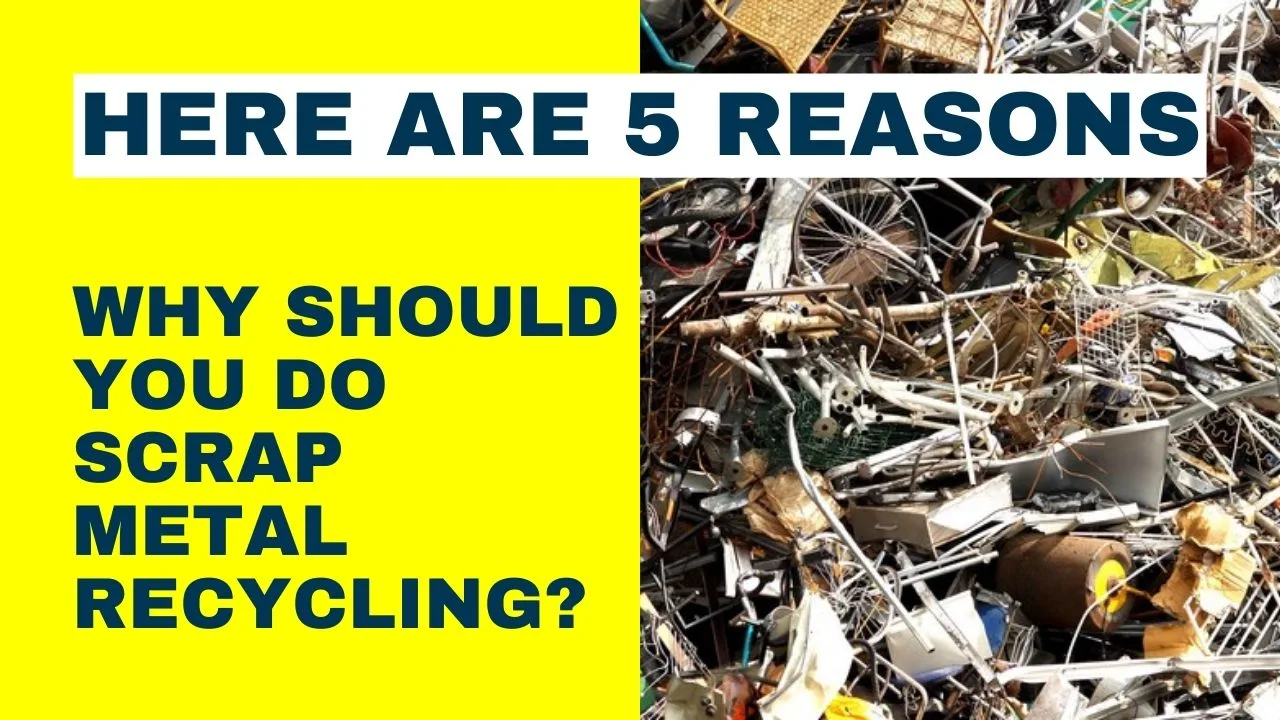Why Should You Do Scrap Metal Recycling? The Top 5 Reasons!

Have scrap metal lying around?
Wondering why you should participate in scrap metal recycling?
Why not recycle? Contribute to sustainability and create value from unused materials.
Ready to give new life to old metal? Let’s discuss everything you need to know about recycling metals.
If you are unsure about which metals you can put in a skip?
Metal scrap recycling is a vital component of sustainable waste management practices in the UK. This process involves collecting, sorting, and processing discarded metal items to recover valuable materials for reuse.
Recycling metal scraps not only conserves natural resources but also significantly reduces energy consumption and minimizes the environmental impact associated with mining and raw material extraction.
One of the primary advantages of metal scrap recycling is its positive contribution to both the environment and the economy. By diverting metal scraps from landfills and incinerators, recycling minimizes the strain on finite resources and diminishes greenhouse gas emissions.
Table of Contents
Types of Metal Scraps for Recycling
Metal scrap comes in two primary categories: ferrous and non-ferrous metals.
Ferrous Metals
Ferrous metals contain iron and are highly magnetic. They are used extensively in construction, manufacturing, and various industries due to their strength and durability. Some common examples are:
- Iron
- Steel
These metals are commonly found in items such as old appliances, vehicles, and structural components.
After recycling, ferrous metals can be repurposed into new steel products, contributing to the reduction of energy-intensive primary steel production.
Non-Ferrous Metals
Non-Ferrous Metals which lack iron and are not magnetic, These materials are prized for their corrosion resistance, electrical conductivity, and malleability. encompass metals like:
- Aluminium
- Copper
- Brass
- Zinc
- and Lead.
These metals are frequently found in electronics, wiring, plumbing fixtures, and packaging materials.
Recycling non-ferrous metals reduces the need for resource-intensive mining, conserving energy and reducing greenhouse gas emissions.
Note: The distinction between ferrous and non-ferrous metals is crucial during the sorting process, as it determines the appropriate recycling methods and end applications.
Scrap Metal Recycling Process
The metal scrap recycling journey involves several interconnected stages.
- It all begins with collection, where discarded metal items are gathered from various sources, including households, industries, and construction sites.
- Once collected, the next phase is sorting, where the materials are separated based on their type and characteristics. This step ensures that the recycling process is efficient and yields high-quality end products.
- Following sorting comes the processing stage. Here, the metal scraps are cleaned, stripped of any non-metal components, and transformed into manageable pieces.
- This processing paves the way for the crucial melting and refining phase, where the metal scraps are melted down to eliminate impurities. During this process, metals are often alloyed to achieve desired properties.
The significance of melting and refining lies in the recovery of valuable metals in their purest forms.
Once refined, these materials can be used to create new products, reducing the need for virgin materials and minimizing environmental impact.
1. Environmental Impact of Scrap Metal Recycling
Metal scrap recycling plays a crucial role in mitigating environmental challenges. By conserving natural resources, such as ores and minerals, recycling significantly reduces the need for extensive mining operations that often disrupt ecosystems and landscapes.
This reduction in mining contributes to the preservation of delicate habitats and a decrease in associated environmental degradation.
Recycling metals demands far less energy than extracting and processing virgin materials. This process translates into lower carbon emissions, aligning with efforts to combat climate change and limit the carbon footprint.
2. Recycling Infrastructure for Metal Scrap in the UK
The UK boasts a well-developed network of recycling facilities dedicated to metal scrap recycling. These include recycling centers, scrap yards, and specialized processing plants strategically located across the country.
These facilities readily accept a wide range of metal scraps, making responsible recycling accessible to both individuals and businesses.
Recycling centers provide convenient drop-off points for various metal items, while scrap yards offer platforms for individuals to sell their metal scraps in exchange for monetary compensation.
3. Benefits of Scrap Metal Recycling for Businesses
Metal scrap recycling offers substantial advantages to industries in the UK. One key benefit is the reduction in raw material costs.
By incorporating recycled metals into their production processes, businesses can decrease their reliance on expensive virgin materials, leading to significant cost savings.
This dual advantage of cost reduction aligns with efficient resource management and enhances the overall profitability of businesses.
4. Regulations and Sustainability Initiatives in Scrap Metal Recycling
The UK maintains a regulatory framework to govern metal scrap recycling, ensuring responsible and environmentally friendly practices.
The Environment Agency sets guidelines to prevent pollution, manage waste, and enforce proper handling and disposal of metal scraps.
Government initiatives play a significant role in driving sustainable recycling practices. Programs aimed at promoting circular economy principles encourage businesses and individuals to embrace recycling and reduce waste.
Moreover, industry standards such as the Waste Electrical and Electronic Equipment (WEEE) regulations enforce the proper recycling of electronics, contributing to the reduction of electronic waste.
5. Challenges and Solutions in Scrap Metal Recycling
While metal scrap recycling brings immense benefits, challenges do arise. Contamination, where non-recyclable materials mix with metal scraps, poses a significant hurdle.
It can compromise the quality of recycled materials and disrupt the recycling process. Strict adherence to proper sorting techniques and consumer education are vital solutions to mitigate contamination.
Improper disposal of metal scraps, often due to lack of awareness or convenience, remains another challenge.
Abandoned or illegally dumped metal scraps can harm the environment and negate recycling efforts. Enhanced public education, convenient collection points, and stricter enforcement of regulations are essential to address this issue.
Conclusion
Scrap metal recycling stands as a dynamic force in shaping a sustainable future. Its multifaceted benefits range from conserving resources and decreasing energy consumption to mitigating environmental impacts.
By converting discarded metals into valuable resources, recycling contributes to circular economies and sustains industries while lessening the requirement for resource-intensive extraction.
As individuals and industries adopt responsible practices, the evolution of recycling technologies and the increasing emphasis on e-waste bode well for a greener future. Embracing scrap metal recycling signifies our dedication to a cleaner, more efficient, and environmentally aware world.






